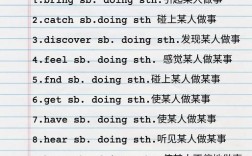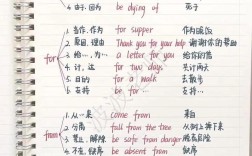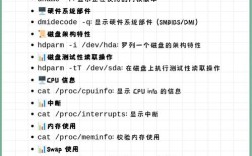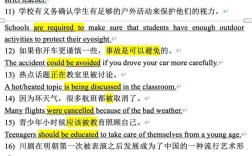情态动词如何变同义句是英语语法转换中的一个重要环节,掌握这一技巧不仅能丰富表达方式,还能提升语言运用的灵活性和准确性,情态动词本身包含“可能性、必要性、能力、意愿”等情态意义,变同义句时需围绕核心情态意义,通过替换情态动词、调整句式结构或转换语气等方式实现,以下从具体情态动词的分类、转换方法、实例分析及注意事项等方面展开详细说明。
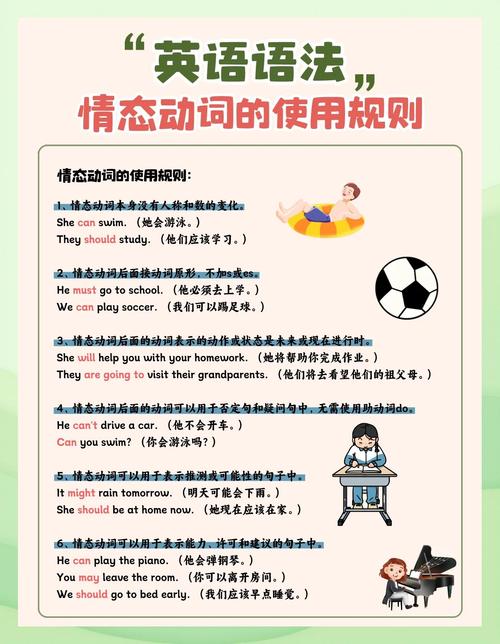
情态动词的核心意义与同义转换原则
情态动词(如can、could、may、might、must、shall、should、will、would、ought to等)的核心在于表达“非事实性”的情态,即说话人对动作或状态的态度,变同义句时,需遵循“保持原意、转换形式”的原则,具体方法包括:
- 替换同义情态动词:根据语境选择意义相近的情态动词,如can→be able to,must→have to;
- 调整句式结构:将主动句变被动句,或将肯定句变否定句(如mustn’t→don’t have to);
- 转换语气与正式程度:如将直接引语变为间接引语时调整情态动词(如can→could);
- 结合非谓语动词或名词结构:用“be+形容词+to do”或“the+名词+of doing”等形式简化表达。
常见情态动词的同义转换方法及实例分析
(一)能力类情态动词:can/could/be able to
核心意义:表示“能力”或“客观可能性”。
-
can→be able to:can表示当前能力,be able to更强调“经过努力成功做到”,且可用于更多时态(如将来时、完成时)。
- 原句:He can solve this problem.
- 同义句:He is able to solve this problem.(当前能力)
- 将来时转换:He will be able to solve this problem.(将来能力)
- 过去完成时转换:He had been able to solve the problem before.(过去已具备的能力)
-
could→was/were able to:could表示“过去的一般能力”,而was/were able to强调“过去成功完成某动作”(相当于managed to do)。
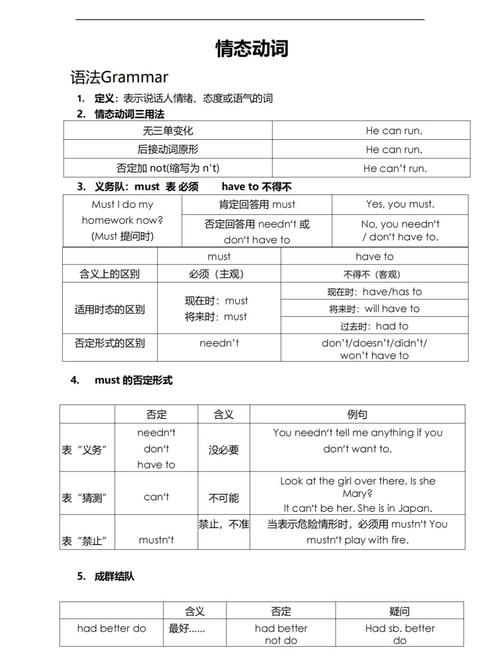 (图片来源网络,侵删)
(图片来源网络,侵删)- 原句:He could swim when he was five.(过去具备能力)
- 同义句:He was able to swim when he was five.
- 强调成功完成:He was able to escape from the fire.(成功逃脱,不用could)
(二)可能性类情态动词:may/might/could
核心意义:表示“推测”或“许可”,其中may/might表“可能”,could表“理论上的可能性”。
-
may→might:may表示较高可能性,might表示较低可能性,两者可互换,但might更委婉。
- 原句:It may rain tomorrow.
- 同义句:It might rain tomorrow.(可能性更低)
-
could→be possible:用“be possible”替代could表推测,更正式。
- 原句:The story could be true.
- 同义句:The story is possible to be true. / It is possible that the story is true.
-
表许可的may→can/be allowed to:may表正式许可,can更口语化,be allowed to强调“被允许”。
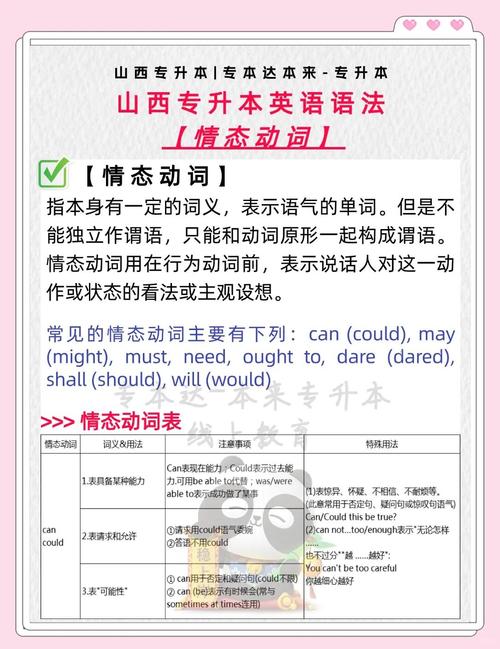 (图片来源网络,侵删)
(图片来源网络,侵删)- 原句:You may leave now.
- 同义句:You can leave now. / You are allowed to leave now.
(三)必要性类情态动词:must/have to/should/ought to
核心意义:must强调“主观必要性”(命令、要求),have to强调“客观必要性”(外界压力),should/ought to表“建议”或“义务”。
-
must→have to:must表示“必须”(主观意愿),have to表示“不得不”(客观情况),且have to可用于更多时态。
- 原句:You must finish your homework.(主观要求)
- 同义句:You have to finish your homework.(客观要求)
- 过去时转换:He had to stay at home yesterday.(客观情况,不用must)
-
mustn’t→don’t have to:mustn’t表示“禁止”,don’t have to表示“不必”,意义相反,需注意区分。
- 原句:You mustn’t touch the wire.(禁止触摸)
- 同义句:You are not allowed to touch the wire. / You are forbidden to touch the wire.
-
should/ought to→had better:should/ought to表“建议”,had better表“强烈建议”,语气更委婉。
- 原句:You should see a doctor.
- 同义句:You had better see a doctor.(更强烈的建议)
-
should→be supposed to:be supposed to表“应该”(按规则或预期),相当于should。
- 原句:You should follow the rules.
- 同义句:You are supposed to follow the rules.
(四)意愿类情态动词:will/would/shall
核心意义:will表“意愿”或“习惯性动作”,would表“过去的意愿”或“委婉请求”,shall表“建议”或“。
-
will→would:will表现在意愿,would表过去意愿或委婉语气。
- 原句:I will help you.(现在意愿)
- 同义句:I would help you.(过去意愿/委婉)
-
shall→will/should:shall在疑问句中表“建议”,可转换为will或should。
- 原句:Shall we go now?(建议)
- 同义句:Will we go now? / Should we go now?
-
will→be willing to:be willing to表“愿意”,强调主观意愿。
- 原句:He will support us.
- 同义句:He is willing to support us.
(五)推测类情态动词(对过去情况的推测)
核心意义:must have done表“肯定过去发生”,can’t have done表“否定过去发生”,may/might have done表“过去可能发生”。
-
must have done→be sure to have done:must have done推测过去肯定发生,be sure to have done语气更强。
- 原句:He must have missed the train.
- 同义句:He is sure to have missed the train.
-
can’t have done→couldn’t have done:can’t have done推测过去不可能发生,couldn’t have done更委婉。
- 原句:She can’t have known the truth.
- 同义句:She couldn’t have known the truth.
-
may/might have done→could have done:may/might have done推测过去可能发生,could have done表“过去本可以做但未做”。
- 原句:He might have forgotten the meeting.(可能忘记)
- 同义句:He could have forgotten the meeting.(本可以忘记,暗示未做)
情态动词同义转换的注意事项
- 语境与语气匹配:同义转换需考虑语境正式程度,如may用于正式场合,can用于口语;had better带警告意味,should更客观。
- 时态一致性:部分情态动词(如can、must)无过去式或将来式,需借助be able to、have to等结构转换时态。
- 否定含义区分:mustn’t(禁止)≠don’t have to(不必),can’t(不可能)≈couldn’t(委婉否定),需避免混淆。
- 固定搭配与习语:有些情态动词与特定搭配固定,如would rather(宁愿)、had better(最好),不可随意替换。
情态动词同义转换方法总结表
| 原情态动词 | 核心意义 | 同义转换形式 | 例句转换 |
|---|---|---|---|
| can | 能力/可能 | be able to | He can speak English. → He is able to speak English. |
| could | 过去能力/可能 | was/were able to | He could swim. → He was able to swim. |
| may | 可能/许可 | might/can/be allowed to | You may enter. → You can enter. |
| must | 必须 | have to | You must obey the rules. → You have to obey the rules. |
| mustn’t | 禁止 | can’t/aren’t allowed to | You mustn’t smoke. → You can’t smoke. |
| should | 建议/义务 | ought to/had better | You should study hard. → You ought to study hard. |
| would | 过去意愿/委婉 | will/be willing to | He would help me. → He was willing to help me. |
| must have | 过去肯定推测 | be sure to have | She must have arrived. → She is sure to have arrived. |
| can’t have | 过去否定推测 | couldn’t have | He can’t have lied. → He couldn’t have lied. |
相关问答FAQs
Q1:为什么“must”和“have to”都表示“必须”,但有时不能互换?
A:两者虽都表“必须”,但语义侧重点不同:“must”强调主观意愿(如命令、要求),而“have to”强调客观外界压力(如规则、环境迫使)。“You must obey your parents”(主观要求父母)和“You have to wear a uniform at school”(客观要求校规)中,互换会导致原意改变。“must”无过去式和将来式,而“have to”可用于各种时态(如had to, will have to),这也是不能互换的原因之一。
Q2:如何区分“could have done”和“might have done”表推测时的差异?
A:两者都可表“过去可能发生”,但“could have done”更侧重“理论上的可能性”(即过去有能力做某事,但不一定发生),而“might have done”更侧重“实际发生的可能性”(即过去某事可能发生,但不确定)。“He could have missed the bus”(他本可能错过公交车,强调能力)和“He might have missed the bus”(他可能错过公交车,强调结果的不确定性),前者暗示“他有能力赶上但可能没赶”,后者仅表示“结果不确定”。

